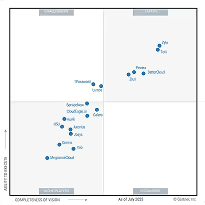HIPAA Compliance Checklist for 2025

According to the CloudEagle.ai IGA 2025 report, over 60% of SaaS applications operate outside IT’s visibility.
This statistic reflects a serious problem: organizations often have little idea how many tools they’re actually paying for, who uses them, and what risks they pose.
As SaaS adoption accelerates, uncontrolled growth leads to unused licenses, duplicate apps, and shadow IT quietly draining budgets and increasing compliance risk.
To regain control, enterprises are turning to SaaS discovery tools, automated solutions that uncover, analyze, and help manage every application across the business.
This guide explores the top SaaS discovery tools to help IT teams regain visibility, reduce waste, and prevent shadow IT.
TL;DR
- SaaS discovery helps organizations automatically identify every cloud app in use, including shadow IT, to cut waste, improve security, and ensure compliance.
- Unused licenses and duplicate apps drain up to 35% of SaaS budgets, as departments buy overlapping tools or fail to offboard users.
- SaaS discovery tools analyze network traffic, SSO logs, and expense data to uncover all active, inactive, and hidden applications in real time.
- Key features to look for: continuous shadow IT detection, duplicate app insights, SSO and finance integrations, and automated license reclamation.
- CloudEagle.ai leads the market with AI-powered discovery, 500+ app integrations, and automated workflows that identify, consolidate, and optimize your SaaS stack effortlessly.
What Is SaaS Discovery and Why Does It Matter?
SaaS discovery is the continuous process of identifying and tracking all SaaS applications used across an organization. It covers both approved tools and unsanctioned “shadow IT.”
Key benefits:
- Cost optimization: Detect and eliminate redundant subscriptions.
- Security: Identify unapproved or risky apps.
- Compliance: Ensure all tools meet governance and policy standards.
- Visibility: Gain a complete view of the company’s SaaS ecosystem.
The stats that matter:
- The average mid-size business uses more than 370 SaaS applications.
- According to Grand View Research, the global SaaS management market will reach $9.8 billion by 2030, growing at a 16% CAGR.
- Roughly 40% of those tools are unmanaged by IT or procurement
Without continuous discovery, organizations struggle to control costs and data exposure.
SaaS discovery tools automate this visibility, allowing you to know what’s being used, by whom, and whether it’s necessary.
The Problem with Unused and Duplicate SaaS Applications
Even in well-managed environments, inefficiencies quietly build up.
Unused subscriptions, overlapping tools, and unapproved applications don’t just waste money; they weaken governance and increase compliance risks.
1. Unused SaaS Licenses
Research shows that 30–35% of SaaS spend is wasted on unused licenses.
These idle subscriptions often go unnoticed until renewal cycles, when finance teams realize the extent of overspending.
Key issues include:
- Inactive accounts: Users who no longer log in but still consume paid licenses.
- Departmental over-purchasing: Teams buying excess seats “just in case.”
- No centralized monitoring: Lack of automated alerts for inactivity.
- Delayed deprovisioning: Offboarded employees retaining license access.
Without structured tracking, these dormant licenses silently erode budgets every quarter.
2. Duplicate Apps
Duplicate applications are another common source of SaaS waste. Different departments often purchase similar tools for identical use cases, creating redundancy and data fragmentation.
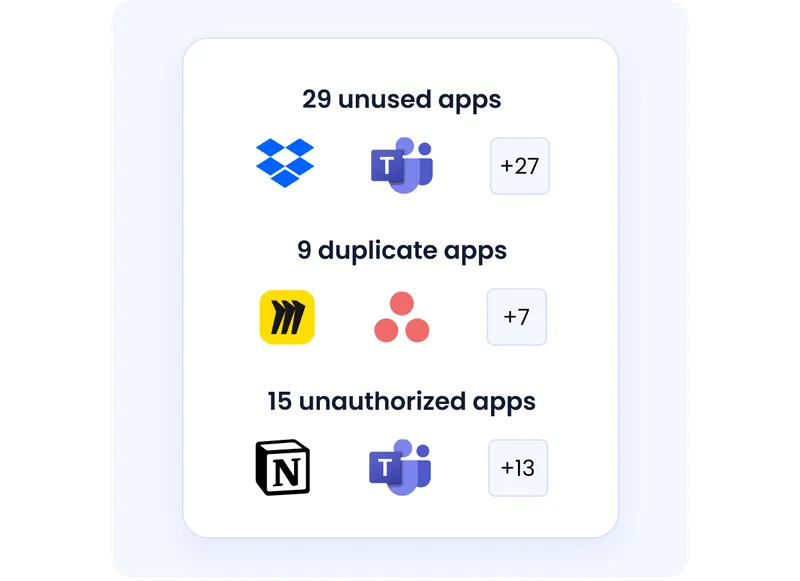
Typical examples include:
- Two or more project management tools (e.g., Asana and ClickUp).
- Multiple communication platforms like Slack, Teams, and Discord.
- Overlapping analytics or design software is used across teams.
3. Shadow IT Discovery Challenges
Shadow IT refers to unauthorized applications used by employees without IT approval.
While it may start with good intentions, finding a faster or cheaper solution introduces significant compliance risks.
Common challenges include:
- Unmonitored data transfers between sanctioned and unsanctioned tools.
- Duplicate user identities outside corporate SSO environments.
- Hidden costs from recurring payments via corporate cards.
- Increased exposure to security breaches and data leaks.
Studies reveal 80% of employees use at least one unapproved SaaS tool.
How SaaS Discovery Tools Work
SaaS discovery tools detect all software-as-a-service applications used within an organization, including unapproved “shadow IT”, by analyzing data from multiple sources such as network traffic, browser activity, local app installations, financial systems, and identity platforms.
Automated Shadow IT Discovery
Automation ensures no SaaS activity goes unnoticed. By connecting to multiple data sources, discovery tools provide real-time visibility into both authorized and shadow applications.
How it works:
- Network traffic analysis to identify new or hidden SaaS apps.
- Expense and credit card integrations to surface unknown subscriptions.
- Identity provider (SSO) logs to track login behavior across platforms.
- API-based scanning for continuous detection of unsanctioned tools.
Identifying and Removing Unused SaaS Licenses
Once discovery is complete, the next step is optimization.
Tools track user engagement and automatically identify inactive or low-usage licenses.
Capabilities typically include:
- Usage analytics: Monitors login frequency and duration.
- Automated alerts: Flags accounts inactive for 30, 60, or 90 days.
- License reclamation: Revokes or reallocates unused licenses.
Detecting Duplicate Applications Automatically
AI-driven discovery engines compare application metadata to detect functional overlaps.
This allows IT to consolidate the stack and eliminate unnecessary redundancies.
Core functions:
- Categorization: Groups tools by use case (e.g., CRM, collaboration).
- Comparison: Detects duplicate apps based on similar features or user bases.
- Vendor insights: Highlights overlapping contracts for consolidation.
- Actionable reporting: Suggests which apps can be merged or retired.
Top SaaS Discovery Tools in 2025
The following SaaS discovery tools represent the best options in 2025, each with its own approach to uncovering unused, duplicate, and shadow applications.
1. CloudEagle.ai
CloudEagle.ai is a market leader in SaaS discovery, spend optimization, and identity governance automation.
Purpose-built for large and mid-market organizations, it delivers a unified view of all cloud applications, user access, and financial data, helping businesses regain complete control of their SaaS ecosystem.
Unlike point solutions that focus only on visibility or security, CloudEagle.ai connects the entire lifecycle, discovery, license management, spend control, and access governance into one intelligent platform.
Features
- Continuous SaaS and IT discovery via direct integrations and expense data.
- Advanced shadow IT discovery using network and identity insights.
- AI-powered detection of duplicate applications and redundant spend.
- Automated license reclamation workflows for unused SaaS licenses.
- Integration with SSO, finance, and HR systems for end-to-end visibility.
- Compliance-ready reports aligned with SOC 2 and ISO 27001 standards.
Benefits
- Faster ROI: Immediate cost savings through license optimization.
- Improved security posture: Detects hidden tools and controls shadow IT.
- Centralized governance: Consolidates all SaaS management functions in one dashboard.
- Automation-first design: Reduces manual work across IT, procurement, and finance.
- Scalable for enterprise: Handles thousands of users and applications seamlessly.
Pricing
CloudEagle.ai offers flexible, usage-based pricing tailored to each organization’s SaaS stack size and integration needs.
2. Microsoft Entra ID (Azure AD)
Microsoft Entra ID, previously known as Azure AD, extends Microsoft’s robust identity platform into IT discovery. It enables organizations already embedded in the Microsoft ecosystem to monitor and control SaaS access at scale.

Features
- Centralized identity management across Microsoft and third-party apps.
- Usage tracking through sign-in logs and authentication events.
- Built-in conditional access policies for compliance enforcement.
- Integration with Azure Security Center for threat monitoring.
Limitations
- Discovery scope limited primarily to Microsoft-connected tools.
- Lacks automated duplicate app detection or cost optimization.
- No native features for reclaiming unused SaaS licenses.
Pricing
Included with Microsoft 365 enterprise packages or available standalone under Entra ID Premium plans, typically starting around $6 per user per month.
3. Google Workspace Admin Console
The Google Workspace Admin Console provides visibility into applications used within the Google ecosystem, helping IT admins manage access, permissions, and SaaS integrations efficiently.

Features
- Monitors app connections through OAuth and Workspace integrations.
- Centralized management of users, permissions, and groups.
- Alerts for suspicious logins and app activity.
- Integrates with Google Vault for audit and compliance purposes.
Limitations
- Focused solely on Google apps and connected third-party services.
- No duplicate app analysis or advanced spend insights.
- Lacks automation for shadow IT discovery outside the Google environment.
Pricing
Included with Google Workspace subscriptions. Plans start at $6 per user per month and scale up to enterprise editions with enhanced security reporting.
4. Okta Workflows
Okta Workflows brings low-code automation to the world of identity and IT discovery. It allows teams to build customized workflows for provisioning, deprovisioning, and detecting anomalies across SaaS environments.
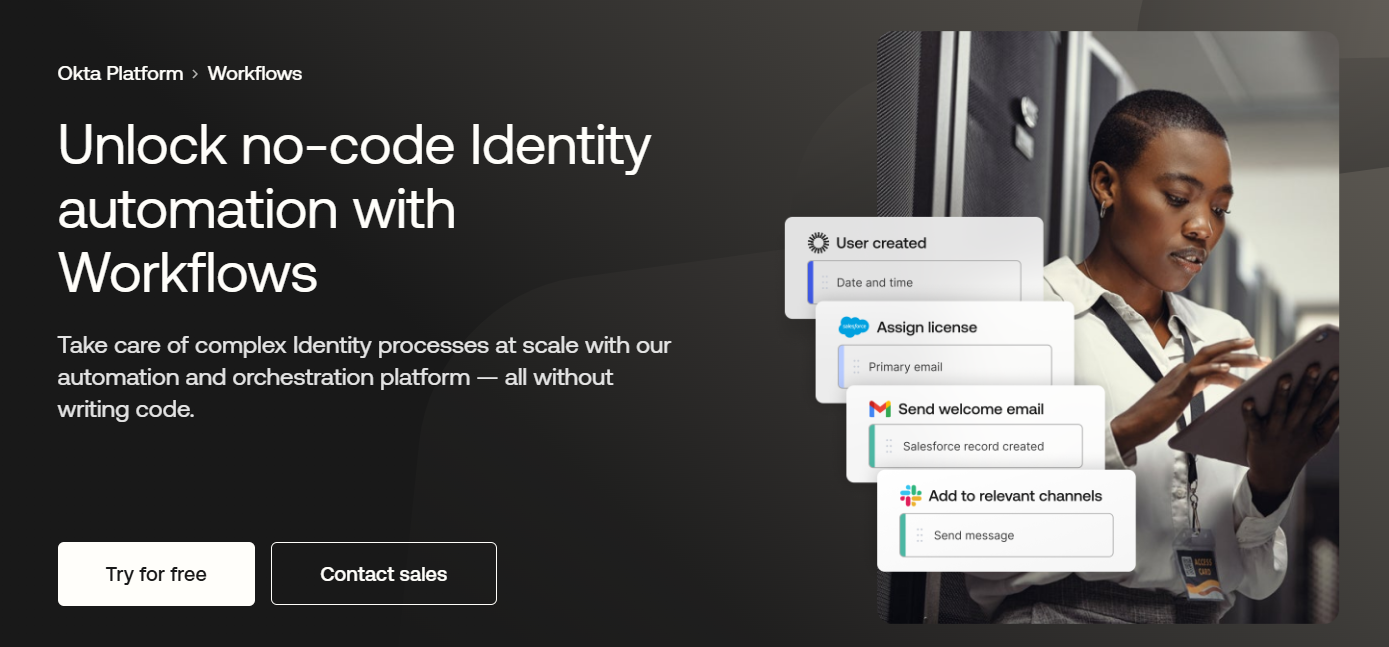
Features
- No-code workflow automation for identity and app provisioning.
- Integration with 300+ SaaS platforms and APIs.
- Automated access removal during employee offboarding.
- Event-based triggers for detecting new app usage.
Limitations
- Primarily identity-focused; limited spend management capabilities.
- Requires integration with external systems for financial tracking.
- Does not automatically identify duplicate apps across teams.
Pricing
Bundled within Okta Identity Governance tiers, typical pricing begins near $9 per user per month, depending on configuration and automation volume.
5. Cisco Cloudlock
Cisco Cloudlock is a cloud access security broker (CASB) designed for data protection and shadow IT discovery. It helps organizations secure their SaaS environments by continuously scanning for risky apps, data-sharing activity, and compliance violations.

Features
- Automated discovery of unsanctioned SaaS usage.
- Real-time threat detection for suspicious cloud activity.
- Data loss prevention (DLP) capabilities for sensitive content.
- Policy enforcement across multi-cloud environments.
Limitations
- Emphasis on security over financial governance.
- Steeper learning curve for teams without CASB experience.
- No native unused SaaS license tracking or optimization.
Pricing
Enterprise-tier subscription model; pricing varies based on the number of monitored apps and users. Entry pricing generally ranges between $3–$5 per user per month.
6. ManageEngine Application Control Plus
ManageEngine’s Application Control Plus offers hybrid visibility across on-premise and SaaS applications, making it suitable for organizations managing both legacy software and cloud services.

Features
- Comprehensive inventory of installed and web-based applications.
- Whitelisting and blacklisting policies for app control.
- Centralized visibility across hybrid environments.
- Integration with ManageEngine’s suite for IT operations and compliance.
Limitations
- Focused more on endpoint governance than full SaaS management
- Minimal duplicate app or license optimization features.
- The user interface may feel outdated compared to newer tools.
Pricing
Available under a perpetual license, starting around $795 for 50 endpoints, with tiered expansion options for larger deployments.
Key Features to Look for in a SaaS Discovery Tool
Selecting the right SaaS discovery tools can make the difference between reactive management and proactive governance.
Shadow IT Detection and Continuous Monitoring
A strong discovery tool should spot unapproved apps instantly and keep monitoring them.
- Real-time scans to identify unauthorized or hidden SaaS apps.
- Automated alerts when new or risky tools appear.
- Continuous shadow IT discovery across browsers, expenses, and networks.
- Trend tracking to highlight unusual user behavior.
Why it matters: It prevents compliance gaps and data exposure caused by unmonitored tools.
Duplicate App and License Usage Insights
Eliminating redundancy is key to SaaS cost control.
- Categorizes apps by use case to uncover duplicate apps.
- Tracks active vs inactive licenses to flag unused SaaS licenses.
- Compares user engagement across similar tools.
- Provides spend insights for consolidation decisions.
Why it matters: It helps IT and finance teams cut duplicate costs and streamline vendor management.
Integration with SSO and Finance Systems for Full Visibility
Visibility improves when IT, finance, and HR data work together.
- Integrates with SSO platforms like Okta, Azure AD, and Google Workspace.
- Syncs with ERP or billing tools to match spend with usage.
- Aligns employee data with app access for cleaner offboarding.
Why it matters: Combining IT discovery with financial visibility ensures accurate renewals and tighter governance.
Why CloudEagle.ai Is the Smart Choice for SaaS Discovery
With over 60% of SaaS and AI tools operating outside centralized oversight, often purchased directly by departments or individual employees, enterprises face escalating risks across compliance, cost, and security.
CloudEagle.ai bridges that gap. It connects with more than 500 SaaS and AI applications, integrates with SSO, finance, and HR systems, and automates everything from discovery to governance.
With CloudEagle.ai, organizations can:
- Reclaim licenses from inactive users automatically.
- Notify stakeholders of duplicate or redundant tools.
- Launch Slack or email workflows to verify access ownership.
- Benchmark pricing data to renegotiate vendor contracts efficiently
500+ SaaS & AI App Integrations
CloudEagle.ai integrates directly with over 500 business applications, covering productivity, collaboration, HR, finance, and engineering tools.
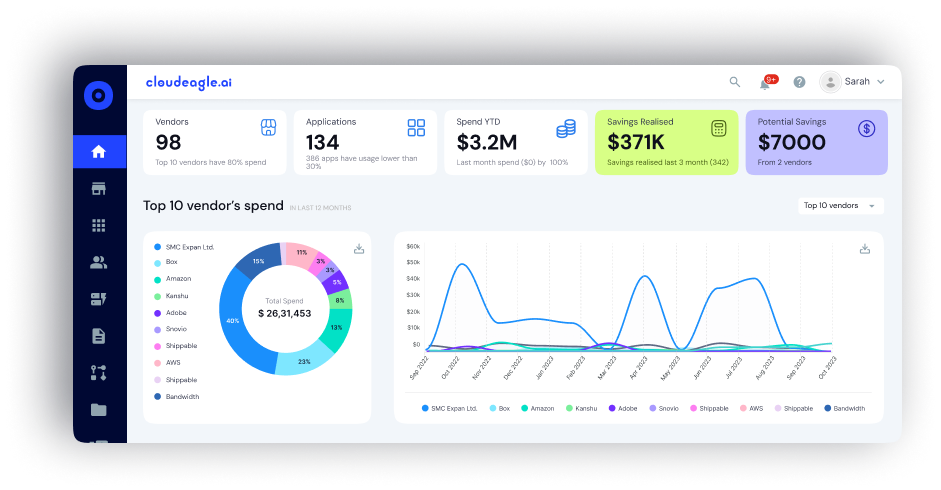
It ensures no app, paid or free, goes unnoticed within your IT discovery process.
AI-Powered App Categorization
Its AI engine classifies every discovered tool by function, category, and usage.
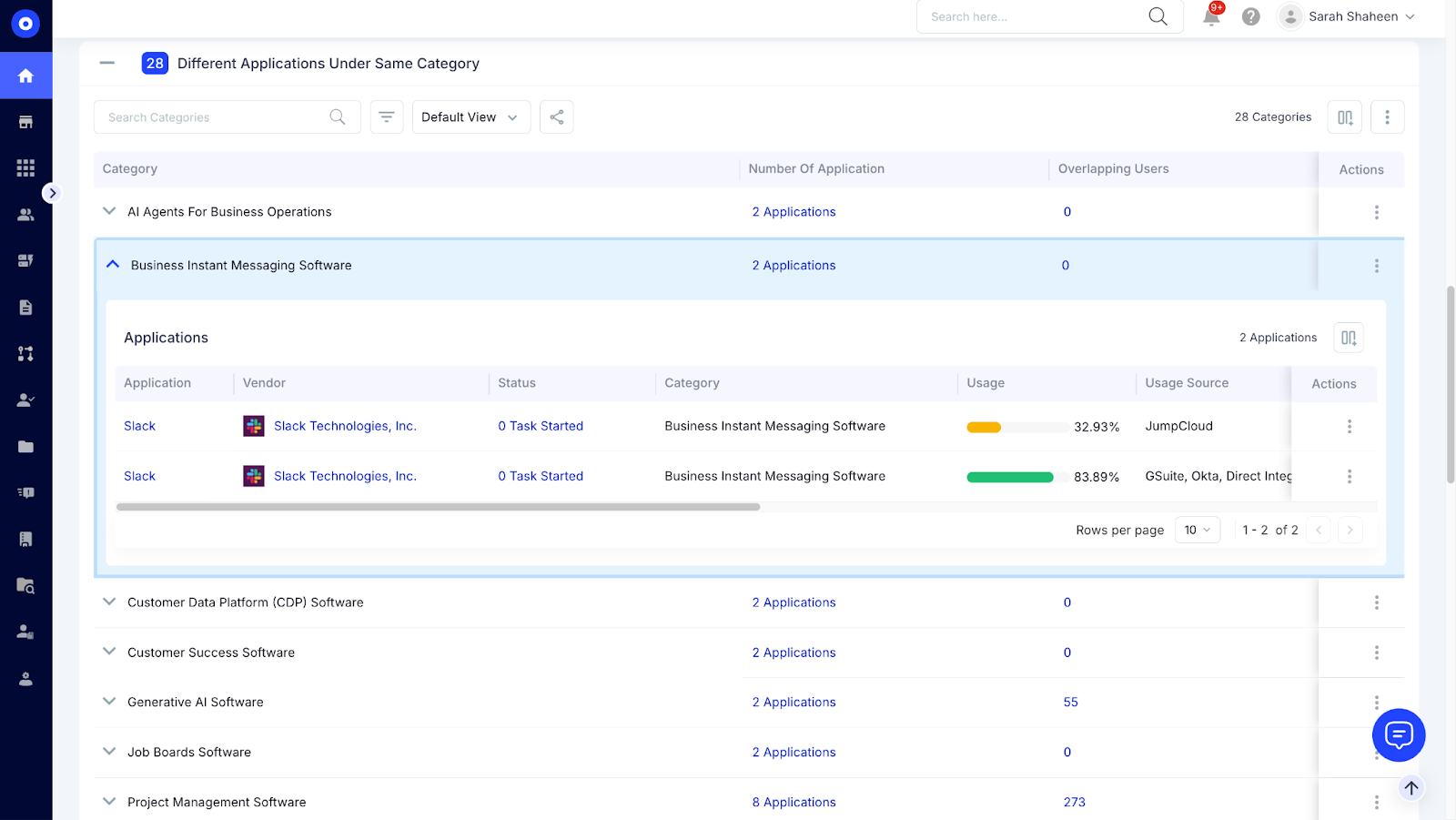
This makes it easy to identify duplicate apps, redundant tools, and overlapping licenses before renewals or audits.
Shadow IT Reports
The platform’s advanced shadow IT discovery scans login data, expense records, and browser history to uncover unsanctioned apps that may expose sensitive company data.
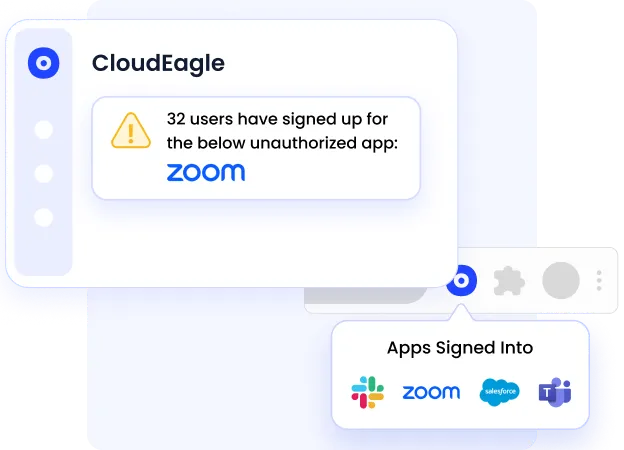
Each finding includes risk levels and ownership insights.
Usage-Based License Insights
Tracks app usage and user engagement in real time to highlight unused SaaS licenses or inactive accounts.
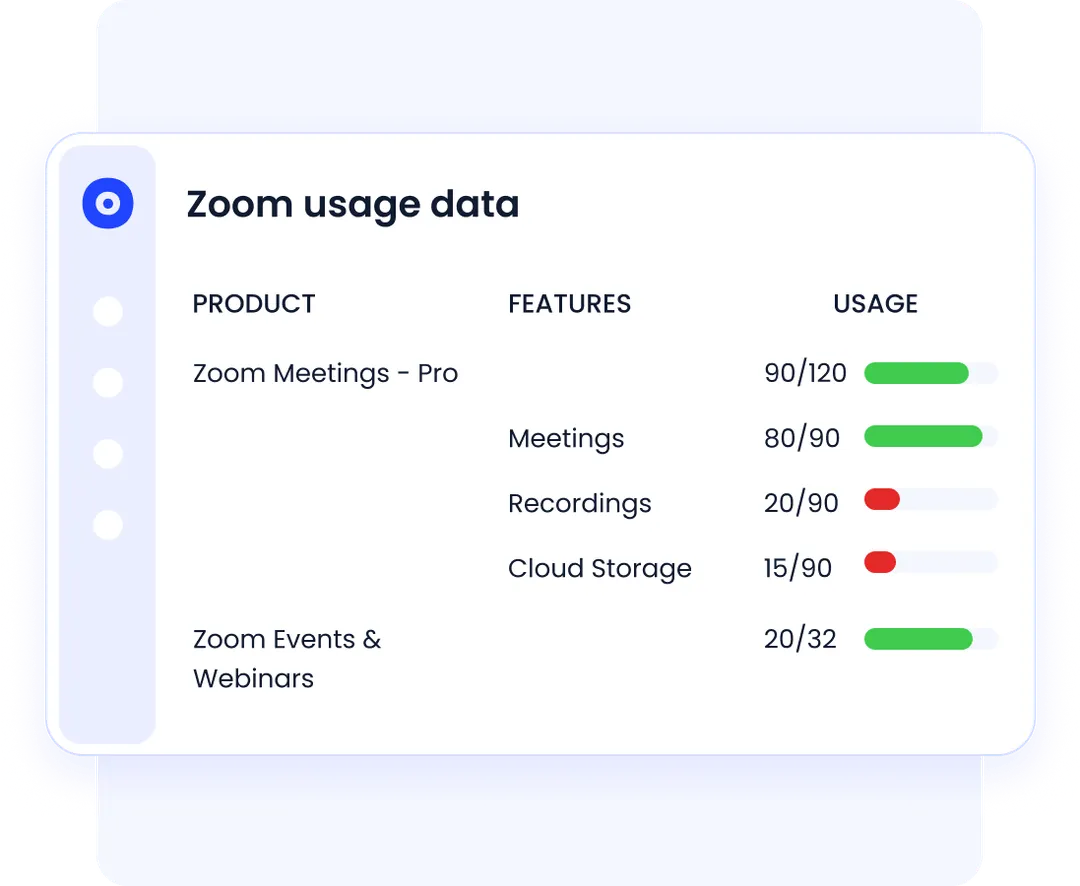
IT and procurement teams can automatically reclaim seats or reassign licenses to active employees.
Department-Level Spend Visibility
CloudEagle.ai combines financial and utilization data, showing exactly which departments are purchasing or using each app.

This transparency helps prevent rogue spending and streamlines budget planning.
Slack & Email Workflows
Automates communication by notifying app owners and users directly in Slack or email for access verification and renewal validation.
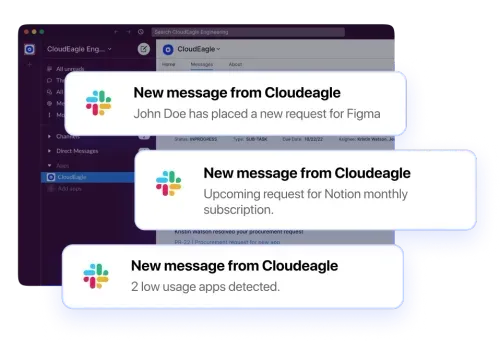
It turns license management from a manual task into a collaborative workflow.
Centralized App Inventory
Provides a unified dashboard that consolidates all discovered applications, access data, and ownership details.
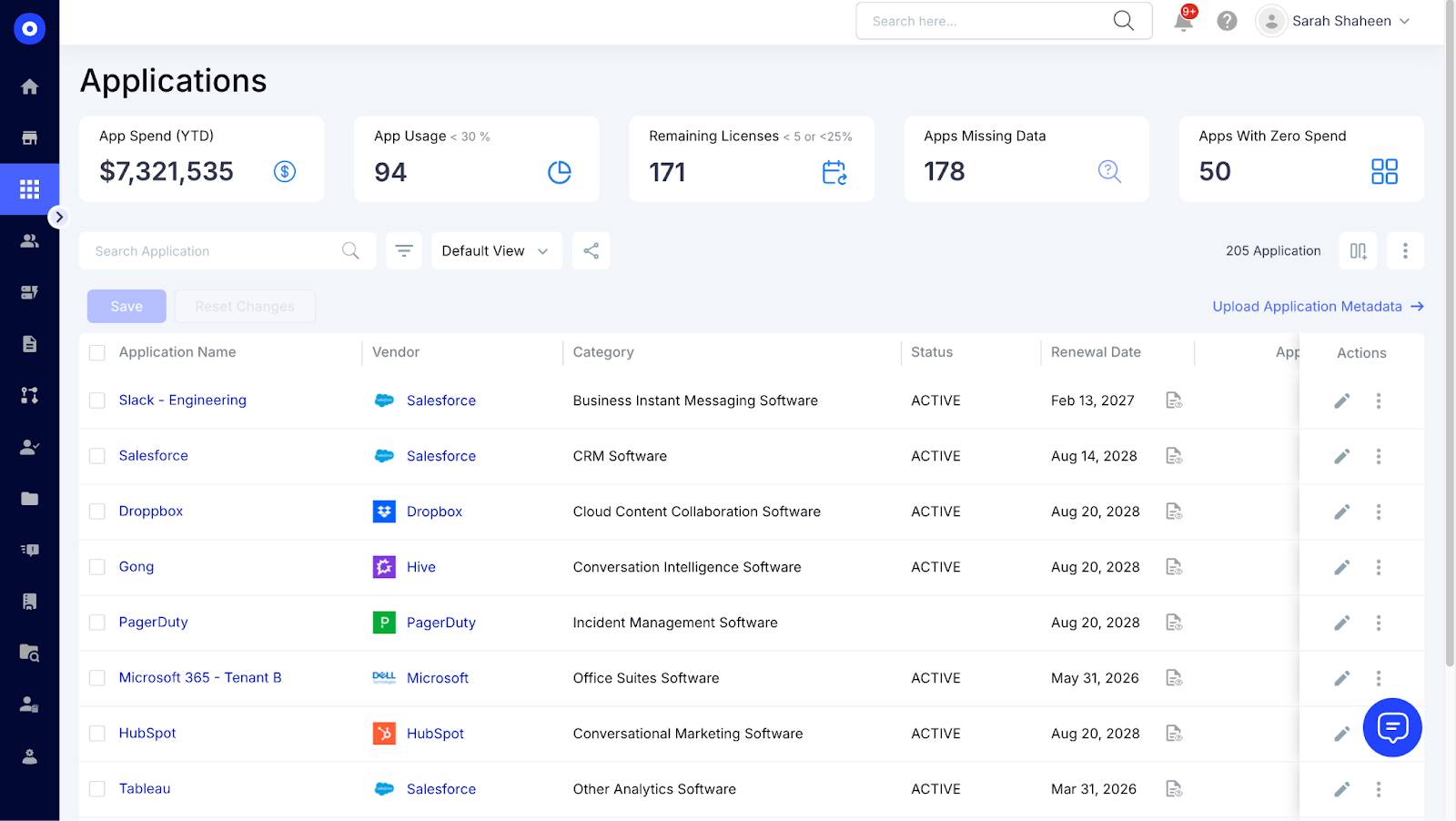
It gives IT, Finance, and Security teams a single source of truth for governance and decision-making.
Final Takeaway
SaaS discovery is no longer a back-office task; it’s a strategic necessity. Without complete visibility, organizations risk paying for unused tools, exposing data to shadow IT, and missing opportunities for optimization.
Automating IT discovery helps teams uncover hidden apps, eliminate duplicate subscriptions, and control spend before it spirals. It ensures compliance, strengthens security, and empowers finance and IT leaders with accurate, actionable data to drive smarter software investments.
Among all available solutions, CloudEagle.ai stands out for its AI-driven automation, deep integrations, and real-time insights. It doesn’t just detect SaaS usage; it transforms it into a strategy, giving organizations complete control over their app ecosystem and spend.
Book a free demo with CloudEagle.ai to see how effortless and impactful automated SaaS discovery can be.
Frequently Asked Questions
1. What is the SaaS discovery process?
SaaS discovery is the process of identifying all cloud applications used across an organization, approved or not, to gain full visibility, eliminate unused tools, and improve cost, compliance, and security management.
2. What is shadow IT detection?
Shadow IT detection uncovers unauthorized or unsanctioned apps employees use without IT approval, helping organizations prevent data leaks, reduce risk, and maintain compliance across their SaaS ecosystem.
3. What is a discovery in IT?
In IT, discovery refers to automatically identifying all devices, software, and applications within an organization’s network to ensure visibility, optimize assets, and enhance security governance.
4. What is the Rule of 40 in SaaS?
The Rule of 40 is a metric used to evaluate the health of a SaaS company. It states that a company’s revenue growth rate plus profit margin should equal 40% or more, showing balanced growth and profitability.
5. What are SaaS tools?
SaaS tools are cloud-based software applications accessed through a browser or app. They require no installation and are subscription-based, helping businesses manage functions like communication, finance, HR, project management, and security.

%201.svg)









.avif)




.avif)
.avif)




.png)
